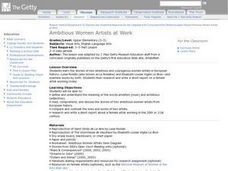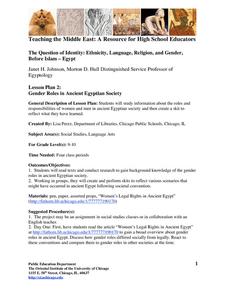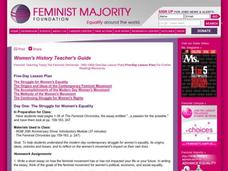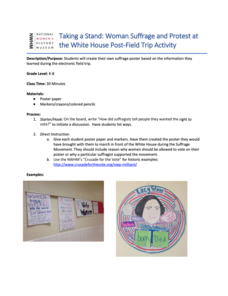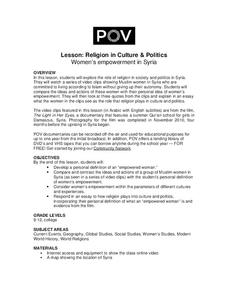Harper Collins
Amazing Women
Helen Keller became a teacher after her experience with Anne Sullivan, demonstrating to the world how valuable a dedicated mentor and determined spirit can be when overcoming adversity. Middle schoolers learn more about the influential...
National Woman's History Museum
How Do We Remember and Honor the Contributions of Women in Public Space?
Public art, especially monuments and memorials, are designed to celebrate and honor those who have made significant contributions to a community or even an entire nation. Here's a lesson that asks scholars to consider who is represented...
C3 Teachers
Black Women Writers: What Gets Black Women Heard?
Zora Neal Hurston, Toni Morrison, and Maya Angelou are featured in a guided inquiry unit. High schoolers research the lives and works of these and other Black women writers and craft an argument, using evidence from their research, to...
J. Paul Getty Trust
Ambitious Women Artists at Work
Ambition is the keyword of a lesson that focuses on the contributions made by famous female artists. Specifically looking at European artists, Luisa Roldan and Elisabeth Louise Vigee Le Brun, scholars examine a piece of their work then...
Curated OER
African American Women Before and After the Civil War: Slavery and Freedom
Learners listen to data on African American women in Texas before the Civil War. In this Civil War lesson, students compare and contrast the lives of slave and free women, and discuss case studies, locating areas on a map. Learners...
University of Chicago
Gender Roles in Ancient Egyptian Society
After reading about the legal status of women in the Old Kingdom of ancient Egypt and doing some additional research, your young historians will work in groups to develop short skits that reflect a typical gender-role related scenario...
National Woman's History Museum
African American Activists
Ida B. Wells, Rosa Parks, and Fannie Lour Hammer are three African American activists who stood up for change. Though living in different time periods, all three women sought justice and equality. Class members examine primary source...
Feminist
Women's History Teacher's Guide
The origins, goals, and struggles of the women's movement are the focus of a five-day series of lessons about the accomplishments of the movement and the continuing struggle for women's rights.
National Woman's History Museum
Taking a Stand: Woman Suffrage and Protest at the White House K-8
A class discussion opens a lesson on women suffragettes. Learners imagine they are preparing to protest for women's voting rights. Scholars create a colorful poster to hold up high when marching in front of the White House.
National Woman's History Museum
The Path to Women’s Suffrage
The Path to Women's Suffrage unit focuses on how Western Expansion was instrumental in gaining women the right to vote through the Nineteenth Amendment. Young historians analyze maps, examine primary source documents, and create a...
DocsTeach
Women of Color and the Fight for Women's Suffrage
Introduce young historians to primary source analysis with a lesson that teaches them how to use a four-step process to analyze a photograph of a 1913 Suffrage Parade. Groups practice the process and share their observations with the...
National Woman's History Museum
Women, Propaganda, and War
Governments rely on propaganda to build support for wars. Class members examine six propaganda posters, two each from the Spanish-American War, World War I, and World War II, and analyze how the way women were portrayed in the posters...
National History Day
Challenging the Status Quo: Women in the World War I Military
Why are some so resistant to change? The status quo is often to blame for a lack of forward movement in society. Following the events of World War I, women in America suddenly had a voice—and were going to use it. Scholars use the...
National Endowment for the Humanities
Women's Suffrage: Why the West First?
Eleventh graders discuss the granting of voting rights to women in several Western states. They take a stand, supported by historical evidence, as to whether or not a single theory explains why Western states were the first to grant full...
National Woman's History Museum
Breaking Barriers: Women’s Basketball Documents
Is basketball ladylike? A pressing debate in the nineteenth century explored the issue in the sports world. Using images, news reports, and the rules of the game, young scholars decide whether the sport helped advance the cause of women...
National Park Service
Adeline Hornbek and the Homestead Act: A Colorado Success Story
Young scholars examine how the Homestead Act impacted the economic opportunities of women. They research the Homestead Act, define Manifest Destiny, and prepare an exhibit featuring an outstanding woman living in their community.
National Endowment for the Humanities
In Her Shoes: Lois Weber and the Female Filmmakers Who Shaped Early Hollywood
Lois Weber has been forgotten. So have Dorothy Davenport Reid, Gene Gauntier, and many others. High school sleuths use advanced search engines to investigate these women and discover clues to their disappearance from filmography and...
Curated OER
Depicting Women and Class in a Global Society
Students explore visual arts that feature women. In this women in art lesson, students analyze "Marquise de Miramon, née Thérèse Feuillant" by Jacques Joseph Tissot and "The Milliners" by Edgar Germain Hilaire Degas. Students compare how...
Curated OER
Women’s Rights – Reading Questions
In this women's rights instructional activity, students respond to 8 short answer questions about women's history in the United States based on assigned textbook reading.
Elizabeth Murray Project
Colonial Women During the Revolution
Young researchers use the Internet or books to find out about colonial women during the American Revolution. They organize information in a graphic to demonstrate their understanding of the research they gathered before writing a...
Luana Game
Women in Science DIY Kit
A card game sheds light on famous women in science. Pairs or small groups collect and exchange color-coded cards. Four cards of the same color make a science lab. The first player to create three labs wins the game! Each card features a...
Tennessee State Museum
Understanding Women’s Suffrage: Tennessee’s Perfect 36
Tennessee was the pivotal state in ratifying women's suffrage in 1920, with its vote coming down to one man: Harry Burn, a 24-year old state representative who changed his nay to an aye on the advice of his mother. Learn...
US House of Representatives
Traditionalist, Feminist, and the New Face of Women in Congress, 1955–1976
As part of a study of women in Congress, class members read the contextual essay, "A Changing of the Guard; Traditionalist, Feminist, and the New Face of Women in Congress, 1955–1976." Groups then research a woman serving during this...
PBS
Religion in Culture & Politics: Women’s Empowerment in Syria
Learners determine their perspective on women's empowerment and then compare it to how it is seen in Syria. They watch four documentary clips, discuss what they've seen, and answer two short essay questions. Excellent resource links and...
Other popular searches
- Women's History Month
- Women's History of 1960's
- Womens History Month
- Women's History Quiz
- Women's History Music
- Non Fiction Women's History
- Us Women's History
- American Women's History
- Women's History Videos
- Texas Women's History
- Womens History Abigail Adams
- March Women's History Month





